How to better manage diabetes
Updated | By ThriveIn
Living with diabetes doesn’t mean your life must stop. Here is how you can better manage diabetes in order to live your life to the fullest.

14 November is World Diabetes Day. Diabetes is a chronic disease that affects millions of people around the world.
According to the International Diabetes Federation, 425 million people worldwide have diabetes and there were 1,826,100 cases of diabetes in South Africa in 2017.
Stats SA’s 2016 mortality report states that diabetes is one of the top two killers among South Africa’s population.
Although diabetes is a killer disease, the good thing is that it is manageable and doesn’t have to take your life.
To better manage it, it’s important for one to know what makes their blood sugar level rise and fall. Monitoring blood glucose levels is a fundamental part of diabetes management.
What causes sugar levels to rise and fall?
There are a lot of things that can affect blood glucose level such as diet, stress, and lack of exercise etc. and it’s important to live a healthy lifestyle and take medication.
ALSO READ: Ten signs you might have diabetes
Let’s look at practical steps that can help you better manage diabetes.
Maintain good mental health
It is important that you keep your stress levels low because stress affects blood glucose levels.
Dr Mercola states that “when you become stressed your body also secretes cortisol and glucagon, both of which affect your blood sugar levels.”
For those who suffer from type 1 diabetes, mental stress can increase or decrease blood sugar levels, while for those with type 2 diabetes it generally increases blood sugar levels.
Depression has also been found to lead to raise low blood sugar risk, according to a recent study.
Depression is a very common accompanying condition for people with diabetes. It's important to know that depression can lead to hypoglycaemic episodes," said study author Dr Wayne Katon, a professor of
psychiatry at the University of Washington Medical School in Seattle.
Health 24 reports that people who suffer from diabetes and are depressed have more than a 40% higher risk of having a severe low blood sugar level (hypoglycaemia) episode that lands them in the hospital compared to people with diabetes who aren't depressed.
To maintain good mental health, it’s important that you talk about your feelings, seek professional help, take good care of your body, do things you love and surround yourself with positivity.
Eat a healthy, balanced diet
According to Diabetes SA, a healthy diet helps you achieve and maintain good control of your blood glucose levels, regulate body weight and prevents or delays the onset of long-term complications of diabetes.
The organisation recommends the following guidelines for selecting food:
· Limit your fat intake.
· Include a food from each of the food groups at each meal.
· If you are overweight, eat smaller portions and reduce your intake of fat.
· Choose a nutritious diet from a variety of foods.
· Cut back on salt.
· Drink plenty of water.
Remember that it’s important to note when you eat and how much you eat.
According to Mayo Clinic too little food in proportion to your diabetes medications — especially insulin — may result in dangerously low blood sugar (hypoglycaemia) while too much food may cause your blood sugar level to climb too high (hyperglycaemia).
Consult a professional dietician who can better assist you in selecting the right food, portions and the best times to eat.
Exercise
Exercise is an important part of your diabetes management and you must exercise regularly.
Exercise can help you maintain a healthy body weight, increases the body’s sensitivity to insulin, reduce stress level and enhance the more efficient use of blood glucose, thereby lowering it.
Talk to your doctor about which exercises are safe for you to do before beginning any exercise regimen.
Maintain a healthy lifestyle
Apart from taking medication, eating healthy and exercising, it’s important to maintain an overall healthy lifestyle.
- Smoking
According to WebMD smoking can be even more hazardous to the health of someone with diabetes.
Centers for Disease Control and Prevention reports that people with diabetes who smoke are more likely than non-smokers to have trouble with insulin dosing and with controlling their disease.
- Drinking
Diabetes SA states that those who suffer from diabetes should limit the amount of alcohol they drink.
According to Freestyle Diabetes.co.uk, people with diabetes are not supposed to drink more than 1 drink per day for women and 2 drinks per day for men.
Medication
It’s very important that you take your diabetes medication consistently.
Don’t stop taking your medication or change your dosage just because you feel better without consulting your doctor.
Taking your medication helps keep your blood sugar levels consistent. Inconsistent blood-sugar levels can cause serious health complications and can even be life-threatening.
Disclaimer: Health-related information provided in this article is not a substitute for medical
advice and should not be used to diagnose or treat health problems. It is always advisable to
consult with your doctor on any health-related issues.
Show's Stories
-
Using music to boost productivity in the workplace
In honour of the office anthem, we would like to share a few ways you c...
Danny Guselli 2 hours ago -
South Africa named most beautiful country in Africa
Well, not to sound vain, but we can understand why...
Danny Guselli 2 hours ago